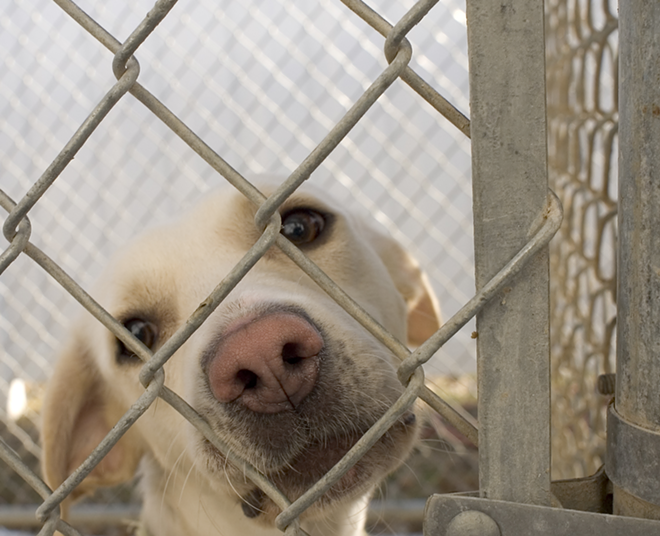During a meeting on a recent Wednesday morning, Hillsborough County Commissioner Kevin Beckner warned that the litany of heinous acts he was about to recite might upset many in his audience.
All were acts of abuse or torture committed against animals somewhere within the county — animals bound and left to die, or beaten so badly they’d lost sight in one eye — accounts of cruelty that made you want to drop everything you’re doing and hug your pet and reconsider whether humanity’s all that great.
“When we talk about pets, it’s like talking about our families,” Beckner said at the meeting. “And while most pet owners are responsible and love their pets, we also know that there are individuals who do not and cause great harm to their pets.”
Beckner had a reason for bringing up the scourge of animal abuse. His hope was that the other commissioners would support launching an animal abuser registry — a list of those convicted of doing harm to animals.
The registry would likely be a public compilation of names, addresses and other information pertaining to misdemeanor or felony offenders. Anyone could access the list, though it’d be of particular interest to agencies that interface between animals and members of the public.
“We’ve seen in practice that this can be a really useful tool, especially for those who are working at shelters, at animal control and so on, who are adopting out animals and who want to know that these animals are being rehomed into a loving home and will not be going to a potentially dangerous situation,” said Lora Dunn, an attorney with the national nonprofit Animal Legal Defense Fund.
It could also help home buyers and renters research prospective neighborhoods to make sure they wouldn’t be living in proximity to animal abusers, and help landlords protect tenants from people who would commit such acts.
The policy seems like a no-brainer.
First, there’s the desire to protect animals. Plus, such a registry would help protect humans.
Veterinarian Betsy Coville helped Beckner make this case.
“Our county has good reason to be concerned about the whereabouts of convicted animal abusers,” she said, “including both the high rate of recidivism and the dangers to the community associated with the the high rate of violence towards animals and violence toward humans.”
The list of well-known serial killers and mass shooters who have harmed animals is long. The statistics drawing a connection between abuse of animals and abuse of humans is alarming: nearly nine out of 10 households where there was abuse of an animal also experienced incidences of domestic violence; three-quarters had a record of child abuse.
“With knowledge of the link between animal and human violence, the coordinated efforts of social services, law enforcement and animal control officers can intervene and break the cycle of aggression,” Coville said.
The county will hammer out the details of the proposal over the coming months. No date for returning to the dais with a plan has been set.
Hillsborough would be far from the first county to adopt such a program. New York’s Suffolk, Albany, Nassau and Orange counties have all enacted them, as has New York City.
There’s also a movement to create statewide animal abuser registries. On Jan. 1, Tennessee became the first to state to do so after years of wrangling. Other states considering such measures include Connecticut, Massachusetts and Michigan.
In 2012, a similar effort in Florida failed, and bills in Illinois, New Jersey, New York, Pennsylvania, Texas, Virginia and West Virginia have met similar fates.
Each registry is set up somewhat differently. Some included those arrested (not just convicted) for such crimes. The amount of time one remains on the list varies as well (though repeat offenders are often permanently placed on it).
Some bar offenders from owning a pet for life, others for a number of years.
The one Hillsborough commissioner to vote against the registry was Stacy White, who hails from the county’s rural eastern region. He said that while he considers himself an animal lover (he has three rescued dogs at home, he said), his concern was that the registry would add an unneeded layer of bureaucracy in the county. There’s already something called the Enjoined Persons List that includes names and other details of those not allowed to have animals in
Hillsborough County, but Beckner said it’s not very well-maintained, nor is it user-friendly.
White added that he really thinks it should be done at the state level.
“What about people that are convicted here and move elsewhere?” he said. “What about people that move to Hillsborough and have a conviction somewhere else?”
Beckner counters that the lack of political will at the state level compels him to act.
“I don’t know if it’s pure politics or what it might be, but obviously the state has failed to act to protect our animals and our citizens. So when they fail to act, that means that we need to take on responsibility and use the authority that we have been entrusted [with] to protect our citizens and our community. And that includes our animals.”
Plus, once Hillsborough creates the registry, other local governments may follow suit; possibly, someday, even the state.
“I would say that enacting an animal abuser registry at a local level is a great first step because it will make a difference in that community, at least to some extent,” Dunn said. “And then the more and more of those local registry bills that pass at the local level, that would send a message, potentially to the state legislature.”
As for the bureaucratic burden of such a program, it may actually be pretty small.
In Tennessee, the nascent list has zero names on it (it is not retroactive), though that is likely to change soon. Local county clerks are required to send names to the Tennessee Bureau of Investigation within 60 days of a conviction, and that agency’s staff simply loads the info onto a web page.
“We’re doing this in a way that minimizes the cost,” said Josh DeVine, a public information officer for the TBI.
While it’s unclear how the details may shake out in Hillsborough, Dunn said what’s important is that there’s a program in the works.
“Animal abuse is really a larger community safety issue, and so we feel regardless of the type of abuser registry that a state or local municipality chooses to enact, we feel that this is a really important method of keeping animals out of the hands of convicted animal abusers, who are known to be very violent criminals.”

















